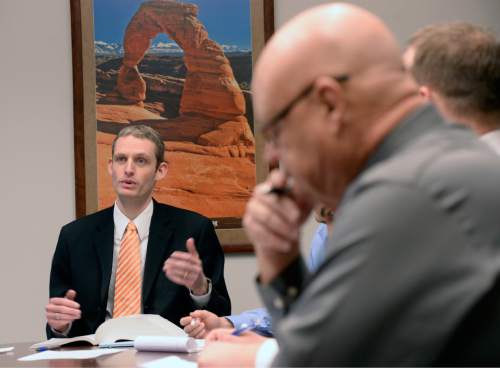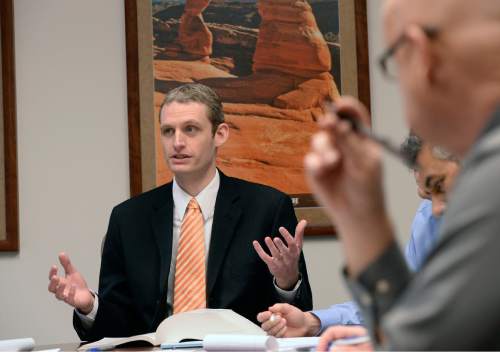This is an archived article that was published on sltrib.com in 2016, and information in the article may be outdated. It is provided only for personal research purposes and may not be reprinted.
The man on the phone promised to provide the coaching necessary to create an online business and sell items through eBay. It sounded good, but then the calls kept coming.
First came the pitch for a company that would help the consumer legally incorporate for the special price of $3,395, followed three days later by an offer for "strategic tax services" for $2,990. The next week a call came pushing a "corporate credit plan" for $3,500. All said they were essential for a startup business. They were not.
"I was tricked into buying something that I did not need and was told I had to pay close to $4,000 for something that would have cost me $100," the consumer wrote after finding out how painless it is to set up a business. "This is so deceptive."
And that corporate credit plan? "I can't believe I paid $3,500 for someone to tell me to get more credit cards!"
This is but one of dozens of complaints filed against Utah-based Daeus Financial Services with the state Division of Consumer Protection after customers scattered nationwide felt ripped off. Daeus has since closed.
(Read a sampling of consumer complaints against Daeus and other business opportunity companies by clicking here.)
A new law, passed during the 2015 legislative session, makes these complaints public for the first time, though it keeps the name and contact information of consumers private.
The law is fairly narrow. It applies only to telemarketers and sellers of business opportunities. The only company complaints subject to disclosure are in cases in which at least 50 complaints have been logged or a customer alleges that $3,500 or more was paid.
The Salt Lake Tribune filed a records request to obtain the data, marking the first release of complaints under the new law. Daeus was one of just five companies that surpassed the 50-complaint mark, drawing 64. AMT Auditing, a company that claimed to audit mortgages for a monthly fee, received 155 complaints, the highest total in the past four years. It closed in 2012.
The others — Supplier Source, Ecommerce Support and Professional Marketing International — were either in the coaching business or sold ancillary products. Along with Daeus, Supplier Source and Ecommerce Support often piggybacked on one another's customers, contacting the same consumers trying to sell multiple products.
Consumer Protection and state Sen. Curt Bramble, R-Provo, who sponsored the new law, say accessing these complaints should give consumers, watchdog groups and the news media a new way to check into the validity of so-called "business-opportunity companies," rooting out the bad actors.
But Truth in Advertising, a national watchdog group, argues Utah's first foray into releasing consumer complaints is too timid and the mechanics of the law too cumbersome to be of real benefit to consumers.
"Utah, Utah, Utah. Glad you opened some records, but, come on, that is a pretty tough restriction that ends up keeping most complaints under wraps," wrote Fran Silverman, in an online post for Connecticut-based Truth in Advertising, announcing a 50-state study of consumer-complaint laws that was triggered by a records fight with Utah.
—
The nature of compromise • The nonprofit group sought access to complaints against Wake Up Now, a defunct Utah multilevel marketing company, in each state. It believes consumer complaints are often more valid than online reviewing sites because companies cannot game them.
Truth in Advertising gave gold stars to New Hampshire, Hawaii and Oregon for placing all consumer complaints on easy-to-search websites, and it gave kudos to South Carolina for publishing an annual "buyer beware" list of companies that ignore complaints or violated agreements with the state's consumer-protection division. Truth in Advertising did not acknowledge that Utah has a similar list on its website.
On the flip side were six states that refused to release anything about the complaints leveled against companies: Alaska, Arizona, Oklahoma, Pennsylvania and Rhode Island.
Utah would have made that list if it wasn't for Bramble' SB157 passed on the last day of the legislative session. The bill mixed an update of public records laws with this more controversial move targeting business-opportunity companies.
Bramble, an accountant, has had clients who felt ripped off by such companies. He originally wanted to make every consumer complaint in this area public, but ran into opposition from the industry that threatened to derail the proposal.
"Generally, that is the nature of a compromise," he said. "No one gets everything that they would like."
It wasn't just industry. The Division of Consumer Protection has traditionally balked at releasing complaints. During Truth in Advertising's dispute over Wake Up Now complaints, Consumer Protection attorney Ché Arguello argued before the state records committee that disclosing the documents would violate the principle of innocent until proven guilty.
"The fact that there may or may not be 1,000 complaints against a company is, in my opinion, with respect to public information, irrelevant," Arguello said.
The records committee sided with the division and blocked access to any complaints in that case, which spurred Truth in Advertising to launch its nationwide study and, it says, Bramble's bill.
—
Exposing bad actors • The senator said he got the idea from news reports and brought together representatives of business-opportunity companies, media lobbyists and Daniel O'Bannon, director of Consumer Protection, to reach a compromise.
O'Bannon said he backed the bill because he's seen some consumers hurt by these businesses, though he reiterates that just because a person files a complaint doesn't mean the allegation is accurate.
"It's certainly not a magic bullet," he said, "but it does provide additional information, one more step of information for consumers to evaluate."
The group hashed out the threshold of 50 complaints over four years or a complaint worth at least $3,500, and Bramble sold it to his colleagues, saying, "with the bad actors, there are several hundred or thousands of complaints."
"One of the challenges in the consumer-protection arena, you don't want to provide a forum for folks with an ax to grind, on the other hand, you don't want to provide a sanctuary for the bad actors," Bramble said of the compromise.
During that legislative debate, the division never checked to see how many companies actually would hit that disclosure threshold, and Bramble didn't ask. It wasn't until The Tribune requested the information in mid-December that the complaints were compiled, and it shows that Bramble's expectations of "hundred[s] or thousands" of complaints against some companies were high.
The newspaper sought a list of companies that fall under the law and the number of complaints against them. A summary of the results and a sampling of the complaints are available at http://www.sltrib.com/consumercomplaints. O'Bannon said the division would consider posting the information on its own website going forward.
"This is still a new law for us," he said. "We are still trying to evaluate how it works, the best way for it to operate for consumers' benefit."
Lawyer Brett Tolman, a former U.S. attorney for Utah, represented some business-opportunity companies during the negotiations — companies that are no longer operating. His clients supported the bill because they thought releasing the data would push out overly aggressive competitors. He thought the division would post the comments online and was surprised that more companies didn't hit the threshold.
—
Selling leads • The complaints received by The Tribune for Daeus and associated companies reveal a pattern. A consumer, often elderly and with little online savvy, receives a call from a salesperson promising to help that customer set up a side business that would make as much as $5,000 per month with little effort. In many cases the business would be related to eBay but hosted on a separate site. Once a consumer signs a contract, the firm sells that "lead" to other similar companies. That is where Daeus came in, offering to set up a corporate entity and to help with taxes and credit, for three more lump-sum payments, and often a monthly fee.
This scenario usually ends with the consumer thousands of dollars in debt, having never sold a thing through a website, if a website was ever created.
One Daeus complaint says: "This has ruined my life in so many ways, because now I have bad credit, used up all of my last savings and now my credit cards are all maxed out. Collection calls are coming in daily and haunting me."
Another says: "Their phone conversations painted nothing but a rosy future for me if I listened to their advice. Instead, they have saddled me with insurmountable debt."
Beyond Daeus and the four other companies with at least 50 complaints, Consumer Protection received another 365 complaints that reached the $3,500 level, led by 21 high-dollar complaints against Premier Mentoring.
Daeus' website remains operable, but the business essentially closed in February 2014, when many of the companies it contracted with were the targets of a Federal Trade Commission investigation. Daeus was not named in that federal case, though its executives Chris Cannon (not the former congressman), Jeff Spangler and Randy Lang entered into a settlement with the state, agreeing to pay a $2,500 fine and refund complaining customers' money.
In a statement, Daeus executives blame the problems on referrals from another company, and said most Daeus clients were happy with the service they received. Any who were unhappy, had their concerns "resolved to the client's satisfaction."
Executives with Daeus and Premier Mentoring have started another business, Zurixx, which operates in the same field, with offices in Utah and Puerto Rico.
Most of the time, Consumer Protection filed an administrative citation against the companies on the list and sought refunds. But in a few cases, including those of Supplier Source and Professional Marketing International, the division has taken no action. O'Bannon said he can neither confirm nor deny that investigations are ongoing.
Bramble said he wants this law to get "some seasoning" before he would look to tweak or expand it in future legislative sessions.
mcanham@sltrib.com Twitter: @mattcanham













